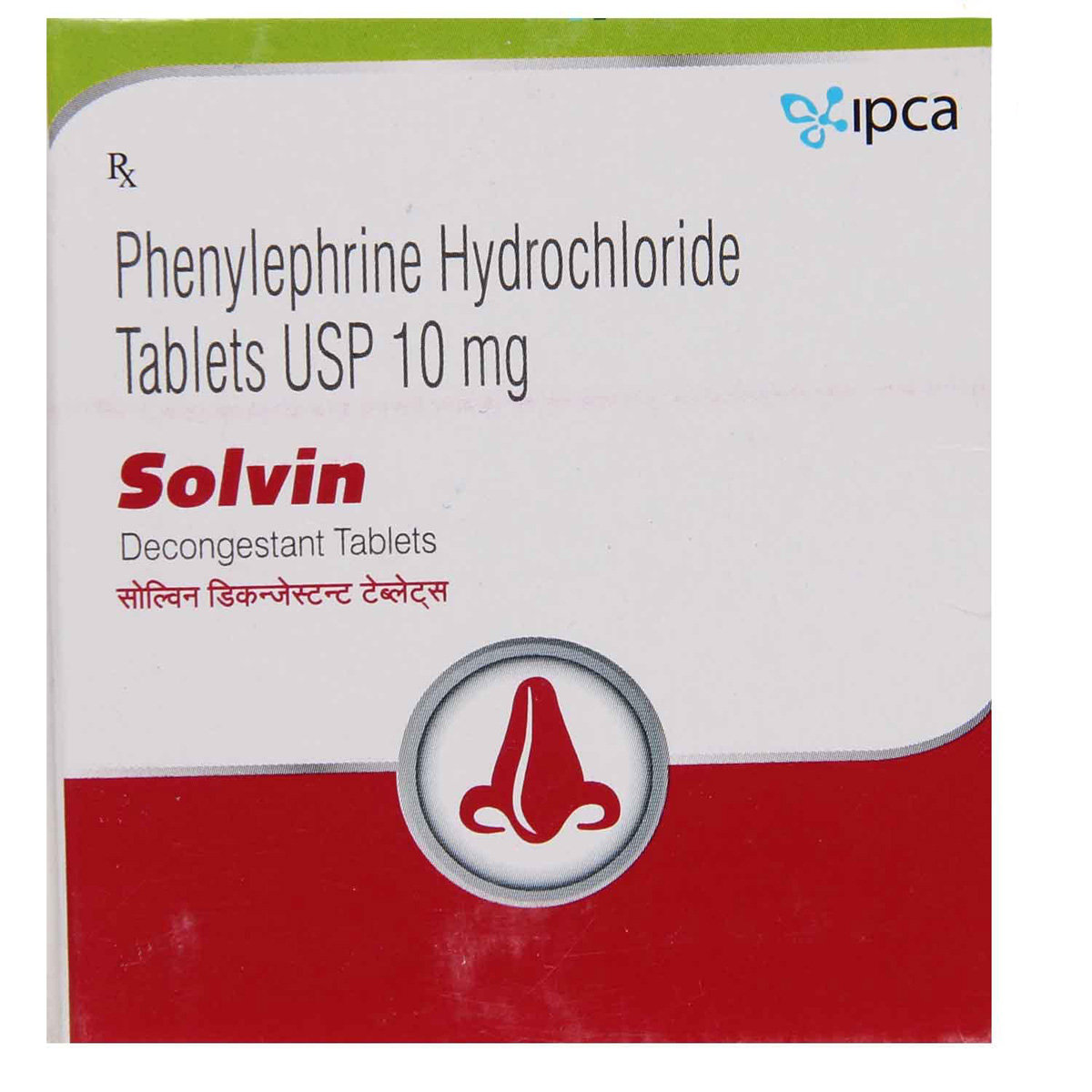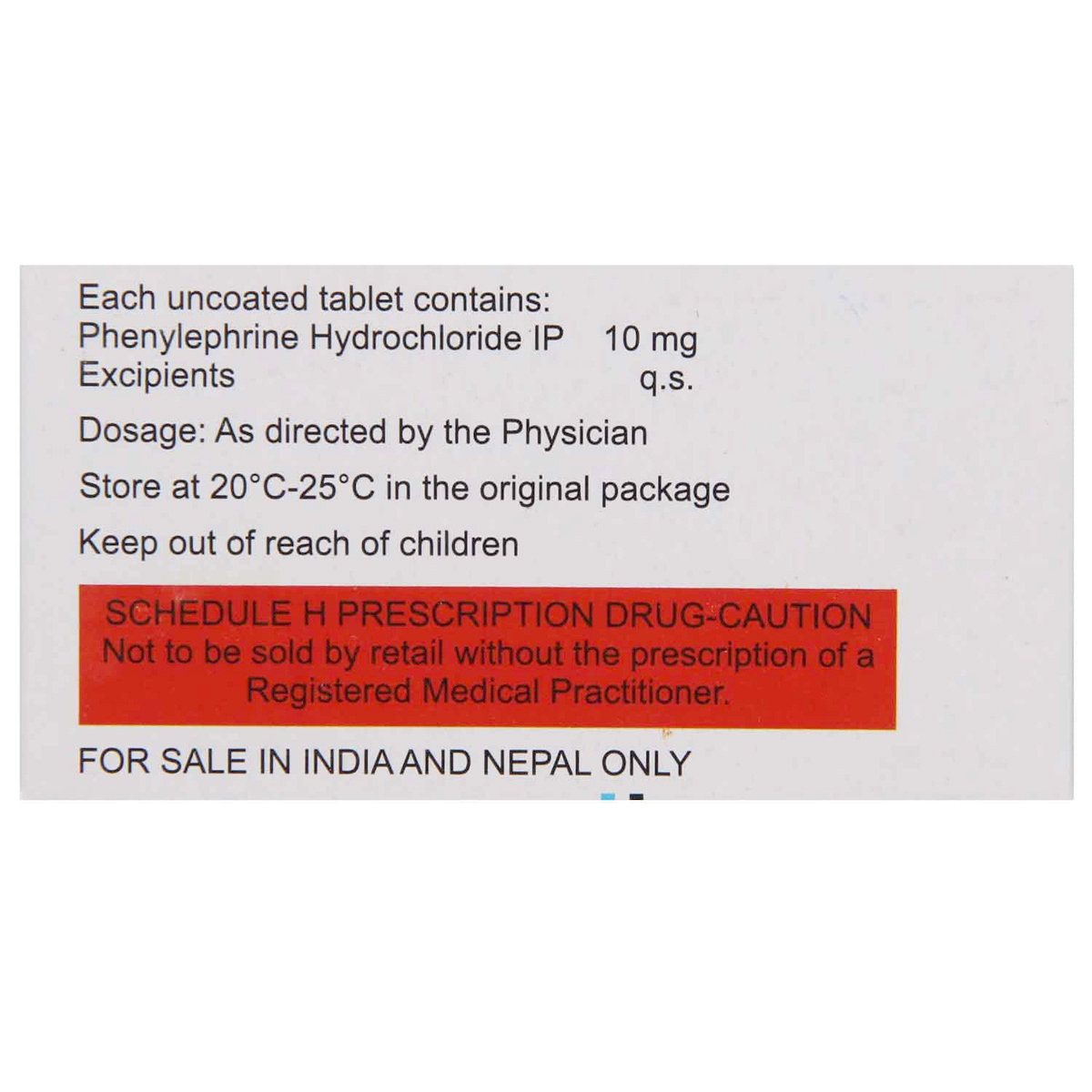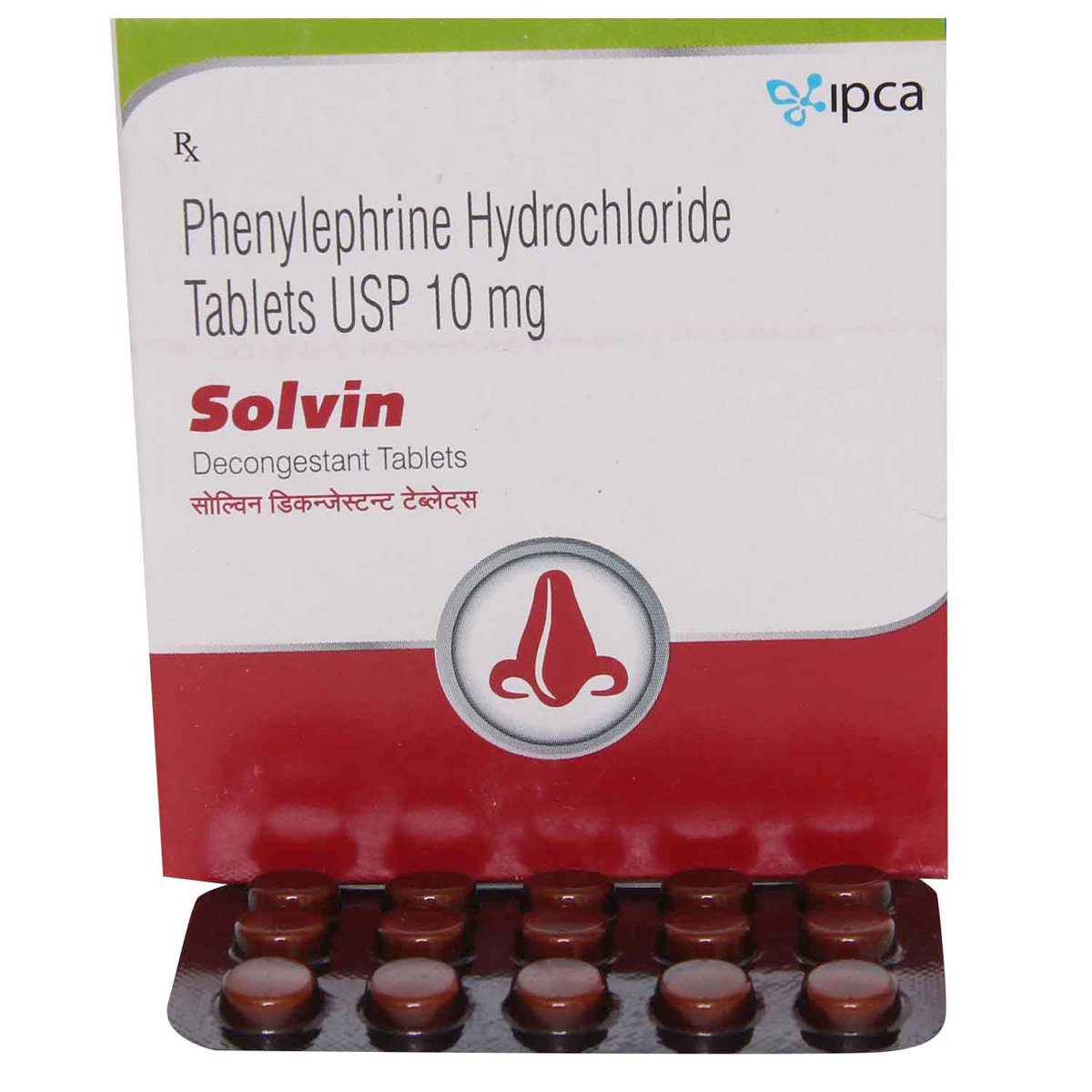Solvin Decongestant Tablet 15's






MRP ₹80
(Inclusive of all Taxes)
₹12.0 Cashback (15%)
Provide Delivery Location
Online payment accepted
 Prescription drug
Prescription drugWhats That
Composition :
Manufacturer/Marketer :
Consume Type :
Expires on or after :
Return Policy :
About Solvin Decongestant Tablet
Solvin Decongestant Tablet belongs to a class of medications called ‘nasal decongestants’ primarily used to relieve blocked nose, stuffy nose and sinus congestion caused by the common cold, hay fever, and other allergies. Nasal congestion (stuffy nose) is a condition in which the obstruction to the airflow in and out of the nose. It can be caused by infections such as common cold, flu or sinusitis, and allergies.
Solvin Decongestant Tablet contains ‘Phenylephrine’ that works by shrinking the small blood vessels in the nasal passage, reducing stuffy nose, providing relief from inflammation (redness and swelling), and making it easier to breathe.
Take Solvin Decongestant Tablet as prescribed. You are advised to take Solvin Decongestant Tablet for as long as your doctor has recommended depending on your medical condition. Some people may experience loss of appetite, flushing (redness, warmth or tingly feeling), restlessness or feeling excited. Most of these side effects of Solvin Decongestant Tablet do not require medical attention and gradually resolve over time. However, if the side effects persist or worsen, please consult your doctor.
Avoid taking Solvin Decongestant Tablet and inform your doctor if you are allergic to Phenylephrine or any other medicines. If you are pregnant or breastfeeding, please inform your doctor before taking Solvin Decongestant Tablet . Solvin Decongestant Tablet is not recommended for children below six years of age. Drive only if you are alert after taking Solvin Decongestant Tablet . Avoid consumption of alcohol with Solvin Decongestant Tablet as it may increase dizziness. Do not take Solvin Decongestant Tablet if you are taking or have taken monoamine oxidase (MAO) inhibitor medicines (used for depression) in the past 14 days. If you have blood circulation problems, including Raynaud's syndrome (decreased blood flow to fingers), inform your doctor before taking Solvin Decongestant Tablet .
Uses of Solvin Decongestant Tablet
Directions for Use
Key Benefits
Solvin Decongestant Tablet contains ‘Phenylephrine’, a nasal decongestant used to treat blocked nose, stuffy nose and sinus congestion caused by the common cold, hay fever, and other allergies. It works by reducing the size of blood vessels in the nose and sinuses. Thus, it helps you to breathe normally and comfortably.
Storage
Drug Warnings
Tell your doctor if you are allergic to Phenylephrine or other medicines. If you are pregnant or breastfeeding, please inform your doctor before taking Solvin Decongestant Tablet . Solvin Decongestant Tablet is not recommended for children below six years of age. Drive only if you are alert after taking Solvin Decongestant Tablet . Avoid consumption of alcohol with Solvin Decongestant Tablet as it may increase dizziness. Do not take Solvin Decongestant Tablet if you are taking or have taken monoamine oxidase (MAO) inhibitor medicines (used for depression) in the past 14 days. If you have blood circulation problems, including Raynaud's syndrome (decreased blood flow to fingers), inform your doctor before taking Solvin Decongestant Tablet . Before taking any other cold or cough medicine with Solvin Decongestant Tablet , please tell your doctor.
Drug-Drug Interactions
Drug-Drug Interactions
Login/Sign Up
Taking Solvin Decongestant Tablet with Propofol may lead to increased levels of Solvin Decongestant Tablet leading to side effects like high blood pressure.
How to manage the interaction:
Taking Solvin Decongestant Tablet with Propofol is not recommended, but it can be taken if prescribed by the doctor. Do not discontinue the medications without consulting a doctor.
Taking Furazolidone with Solvin Decongestant Tablet can cause an increase in high blood pressure.
How to manage the interaction:
Taking Furazolidone with Solvin Decongestant Tablet is not recommended, it can be taken if prescribed by the doctor. However, if you experience sudden and severe headache, blurred vision, confusion, seizures, chest pain, nausea or vomiting, sweating, lightheadedness, fainting, sudden numbness or weakness (especially on one side of the body), speech difficulties, fever, consult the doctor immediately. It is advised to use Solvin Decongestant Tablet only after 14 days of stopping Furazolidone.
Co-administration of Solvin Decongestant Tablet with Sevoflurane can increase the levels of Solvin Decongestant Tablet and lead to side effects.
How to manage the interaction:
Taking Solvin Decongestant Tablet with Sevoflurane is not recommended, it can be taken if prescribed by the doctor. Do not discontinue the medications without consulting a doctor.
Taking Tranylcypromine with Solvin Decongestant Tablet can increase the risk of high blood pressure.
How to manage the interaction:
Taking Tranylcypromine with Solvin Decongestant Tablet is not recommended, but can be taken together if prescribed by a doctor. However, consult a doctor if you experience severe headache, blurred vision, confusion, seizures, chest pain, nausea or vomiting, sudden numbness or weakness (especially on one side of the body), speech difficulties, fever, sweating, lightheadedness, and fainting Do not discontinue any medications without consulting a doctor.
Co-administration of Selegiline with Solvin Decongestant Tablet together can raise blood pressure.
How to manage the interaction:
Taking Selegiline with Solvin Decongestant Tablet is not recommended, it can be taken together if prescribed by a doctor. However, consult a doctor immediately if you experience any symptoms such as severe headache, blurred vision, confusion, fits, chest pain, nausea or vomiting, sudden numbness or weakness (especially on one side of the body), speech difficulties, fever, sweating, lightheadedness, and/or fainting Do not discontinue any medications without consulting a doctor.
Co-administration of Topiramate can cause increased body temperature and decreased sweating, and these effects may be worsened when combined with medications like Solvin Decongestant Tablet.
How to manage the interaction:
Although there is a possible interaction between Solvin Decongestant Tablet and Topiramate, you can take these medicines together if prescribed by your doctor. However, if you experience any unusual symptoms, consult the doctor. Do not discontinue any medications without consulting a doctor.
Co-administration of Solvin Decongestant Tablet with Halothane may increase the risk of an irregular heart rhythm.
How to manage the interaction:
Although taking Solvin Decongestant Tablet with Halothane together can result in an interaction, it can be taken if a doctor has prescribed it. However, if you experience any symptoms like lightheadedness, fainting, irregular heart beat, dizziness, consult the doctor. Do not discontinue any medications without a doctor's advice.
Co-administration of Nortriptyline with Solvin Decongestant Tablet may lead to side effects like increased blood pressure.
How to manage the interaction:
Although taking Nortriptyline and Solvin Decongestant Tablet together can result in an interaction, it can be taken if a doctor has prescribed it. Regular monitoring of blood pressure is advised. Do not discontinue any medications without a doctor's advice.
Co-administration of Amoxapine and Solvin Decongestant Tablet together may lead to side effects like increased blood pressure.
How to manage the interaction:
Taking Solvin Decongestant Tablet and Amoxapine together can result in an interaction, it can be taken if a doctor has advised it. However, if you experience any unusual symptoms, consult the doctor. It is advised to maintain blood pressure. Do not discontinue any medications without a doctor's advice.
Co-administration of Solvin Decongestant Tablet with Phenelzine can result in extremely high blood pressure which may be serious.
How to manage the interaction:
There may be a possibility of interaction between Solvin Decongestant Tablet and Phenelzine, but it can be taken if prescribed by a doctor. However, If you develop a sudden, severe headache, blurred vision, confusion, chest pain, nausea, vomiting, sudden numbness or weakness (particularly on one side of the body), difficulty speaking, fever, sweating, lightheadedness, or fainting, consult a doctor immediately. Do not stop using any medications without a doctor's advice.
Drug-Food Interactions
Drug-Food Interactions
Login/Sign Up
Diet & Lifestyle Advise
- Wash your hands with soap and water regularly to prevent the spread of germs.
- Eat plenty of foods rich in good bacteria, like yoghurt, to improve overall health.
- Drink plenty of fluids to avoid dehydration.
- Gargle with salt water for relief from sore throat.
- Avoid alcohol consumption with Solvin Decongestant Tablet as it may cause tiredness, drowsiness or lack of concentration.
Side Effects of Solvin Decongestant Tablet
- Loss of appetite
- Flushing (redness, warmth or tingly feeling)
- Restlessness
- Feeling excited
- Nervousness
- Dizziness
Habit Forming
Therapeutic Class
All Substitutes & Brand Comparisons
Author Details
We provide you with authentic, trustworthy and relevant information
Drug-Diseases Interactions
Drug-Diseases Interactions
Login/Sign Up
FAQs
Solvin Decongestant Tablet contains ‘Phenylephrine’, a nasal decongestant that works by reducing the size of blood vessels in the nose and sinuses. Thus, it helps you to breathe more easily.
You are recommended to avoid taking Solvin Decongestant Tablet if you have diabetes as it may increase blood sugar levels. Therefore, if you have diabetes, please inform your doctor before taking Solvin Decongestant Tablet .
You are recommended to use Solvin Decongestant Tablet for as long as your doctor has prescribed it. However, do not take Solvin Decongestant Tablet for more than seven days unless advised by your doctor. If the symptoms persist or worsen even after using Solvin Decongestant Tablet for seven days, please consult your doctor.
Drug-Drug Interactions Checker List
- DIGOXIN
- AMITRIPTYLINE
- GLYCERYL TRINITRATE
- ATENOLOL
Disease/Condition Glossary
Nasal congestion is a condition in which the obstruction to the airflow in and out of the nose. It can be caused by infections such as common cold, flu or sinusitis, and allergies. Inflammation due to infection and allergic reaction can cause excessive mucus and make it difficult for it to drain from the nose. Nasal congestion symptoms are stuffy nose, sinus pain, mucus buildup, and swollen nasal tissue, difficulty breathing through the nose.

Have a query?
Buy best Respiratory System products by
Cipla Ltd
Lupin Ltd
Glenmark Pharmaceuticals Ltd
Sun Pharmaceutical Industries Ltd
Alkem Laboratories Ltd
Macleods Pharmaceuticals Ltd
Mankind Pharma Pvt Ltd
Zydus Healthcare Ltd
Leeford Healthcare Ltd
Dr Reddy's Laboratories Ltd
Zydus Cadila
Abbott India Ltd
Intas Pharmaceuticals Ltd
Alembic Pharmaceuticals Ltd
German Remedies Ltd
Centaur Pharmaceuticals Pvt Ltd
Ipca Laboratories Ltd
Aristo Pharmaceuticals Pvt Ltd
Pristine Pearl Pharma Pvt Ltd
Wockhardt Ltd
GlaxoSmithKline Pharmaceuticals Ltd
Zuventus Healthcare Ltd
Koye Pharmaceuticals Pvt Ltd
Micro Labs Ltd
Blue Cross Laboratories Pvt Ltd
Medishri Healthcare Pvt Ltd
Med Manor Organics Pvt Ltd
Indiabulls Pharmaceuticals Pvt Ltd
Adonis Laboratories Pvt Ltd
FDC Ltd
Fourrts India Laboratories Pvt Ltd
Tablets India Ltd
J B Chemicals & Pharmaceuticals Ltd
Shreya Life Sciences Pvt Ltd
Divine Savior Pvt Ltd
Indoco Remedies Ltd
Seagull Pharmaceutical Pvt Ltd
Yash Pharma Laboratories Pvt Ltd
Torque Pharmaceuticals Pvt Ltd
Uniza Healthcare Llp
Wings Pharmacuticals Pvt Ltd
Biological E Ltd
Corona Remedies Pvt Ltd
Icarus Health Care Pvt Ltd
Steris Healthcare
Apex Laboratories Pvt Ltd
Geno Pharmaceuticals Pvt Ltd
Navil Laboratories Pvt Ltd
Precept Pharma
Aar Ess Remedies Pvt Ltd
La Renon Healthcare Pvt Ltd
Torrent Pharmaceuticals Ltd
Astra Zeneca Pharma India Ltd
Biochem Pharmaceutical Industries Ltd
Comed Chemicals Ltd
Entod Pharmaceuticals Ltd
Franco Indian Pharmaceuticals Pvt Ltd
Healthgate Pvt Ltd
Intra Life Pvt Ltd
Megma Healthcare Pvt Ltd
Pfizer Ltd
RPG Life Sciences Ltd
Unipark Biotech Pvt Ltd
Votary Laboratories (India) Ltd
Wanbury Ltd
Brinton Pharmaceuticals Ltd
Dolvis Bio Pharma Pvt Ltd
Eisen Pharmaceutical Co Pvt Ltd
Group Pharmaceuticals Ltd
Knoll Pharmaceuticals Ltd
Morepen Laboratories Ltd
Panacea Biotec Ltd
Prevego Healthcare & Research Pvt Ltd
Rnd Laboratories Pvt Ltd
Sanatra Healthcare Ltd
Skn Organics Pvt Ltd
Stedman Pharmaceuticals Pvt Ltd
Thuyam Life Pvt Ltd
Timon Pharmaceuticals Pvt Ltd
Aglowmed Pharmaceuticals Ltd
Ajanta Pharma Ltd
Alniche Life Sciences Pvt Ltd
Bio Warriors Pharmaceucticals Pvt Ltd
Biochemix Health Care Pvt Ltd
Cadila Healthcare Ltd
Cadila Pharmaceuticals Ltd
Caplet India Pvt Ltd
Chemo Healthcare Pvt Ltd
Delcure Life Sciences Ltd
East West Pharma India Pvt Ltd
Elder Pharmaceuticals Ltd
Embiotic Laboratories (P) Ltd
Emcee Pharmaceuticals (P) Ltd
Foregen Healthcare Ltd
Hetero Healthcare Pvt Ltd
Incite Pharmaceuticals
Iva Healthcare Pvt Ltd
Kepler Healthcare Pvt Ltd
Kristal Pharmaceuticals
Lincoln Pharmaceuticals Ltd
Alcohol
Safe if prescribed
Avoid consumption of alcohol with Solvin Decongestant Tablet as it may increase dizziness. However, if you have any concerns, please discuss them with your doctor.
Pregnancy
Consult your doctor
Limited information is available. Solvin Decongestant Tablet is a pregnancy Category C medicine. Solvin Decongestant Tablet is not recommended for use during pregnancy unless clearly necessary. Therefore, if you are pregnant or planning pregnancy, please consult your doctor before taking Solvin Decongestant Tablet .
Breast Feeding
Consult your doctor
Limited information is available. Therefore, if you are a breastfeeding mother, please consult your doctor before taking Solvin Decongestant Tablet .
Driving
Safe if prescribed
Solvin Decongestant Tablet may cause dizziness. Hence, drive only if you are alert after taking Solvin Decongestant Tablet .
Liver
Consult your doctor
If you have liver problems, please consult your doctor before taking Solvin Decongestant Tablet .
Kidney
Consult your doctor
If you have kidney problems, please consult your doctor before taking Solvin Decongestant Tablet .
Children
Safe if prescribed
Solvin Decongestant Tablet is not recommended for children below six years of age. Solvin Decongestant Tablet should not be given to children below 12 years without a doctor's prescription.





